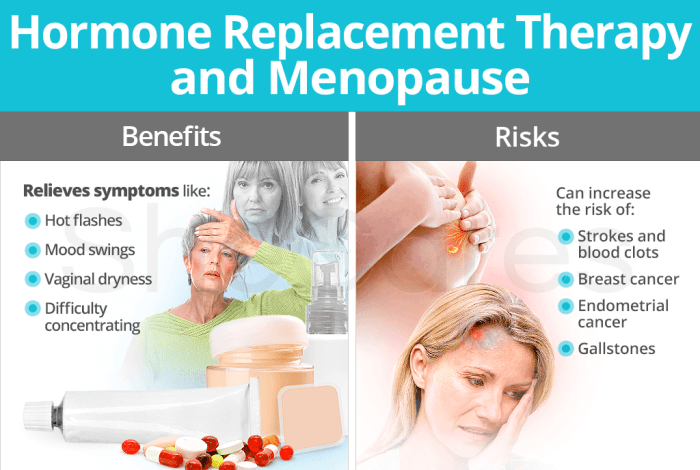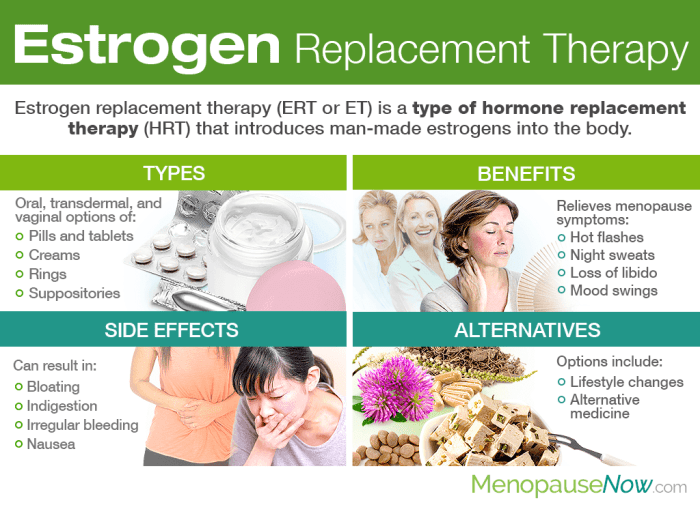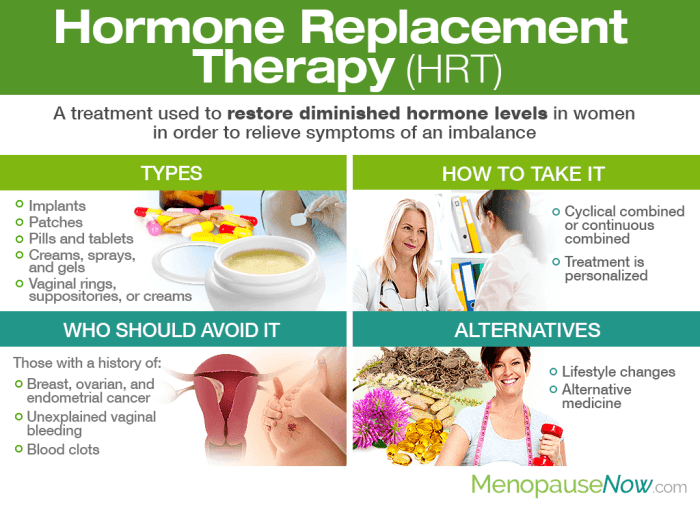Hormone therapy for menopause offers a lifeline to women experiencing the often debilitating symptoms of menopause. This treatment, involving the administration of estrogen and/or progesterone, aims to alleviate the physical and emotional challenges associated with this transition.
Menopause, a natural decline in reproductive hormones, brings about a range of symptoms, including hot flashes, night sweats, vaginal dryness, mood swings, and sleep disturbances. Hormone therapy effectively addresses these symptoms by replenishing the hormones that are diminishing during menopause.
Overview of Hormone Therapy for Menopause
Menopause, the natural cessation of menstruation, occurs when a woman’s ovaries stop producing eggs. This hormonal shift can lead to various symptoms, including hot flashes, night sweats, vaginal dryness, and mood changes.
Hormone therapy (HT) is a treatment option that replaces the hormones lost during menopause. It can alleviate menopausal symptoms and reduce the risk of certain health conditions, such as osteoporosis.
Types of Hormone Therapy
There are three main types of HT:
- Estrogen-only therapy:Replaces estrogen, the primary hormone responsible for female reproductive function. It is prescribed for women who have had a hysterectomy (removal of the uterus).
- Progesterone-only therapy:Replaces progesterone, a hormone that helps regulate the menstrual cycle. It is prescribed for women who still have their uterus to prevent endometrial hyperplasia (thickening of the uterine lining).
- Combined hormone therapy:Combines estrogen and progesterone. It is the most common type of HT and is prescribed for women who have not had a hysterectomy.
Benefits of Hormone Therapy for Menopause
Hormone therapy for menopause offers numerous potential benefits for women experiencing the symptoms of menopause. These benefits can include:
Reducing Vasomotor Symptoms
One of the most significant benefits of hormone therapy is its effectiveness in reducing vasomotor symptoms, such as hot flashes and night sweats. These symptoms can be debilitating and significantly impact a woman’s quality of life. Hormone therapy works by replenishing the levels of estrogen and progesterone in the body, which helps regulate body temperature and reduce the frequency and severity of hot flashes.
Improving Mood, Sleep, and Cognitive Function
In addition to reducing vasomotor symptoms, hormone therapy can also improve mood, sleep, and cognitive function. Many women experience mood swings, irritability, and difficulty sleeping during menopause due to hormonal fluctuations. Hormone therapy can help stabilize these fluctuations, resulting in improved mood and sleep quality.
Furthermore, studies have shown that hormone therapy can improve cognitive function in postmenopausal women. Estrogen is known to play a role in cognitive function, and hormone therapy can help maintain or improve cognitive abilities, such as memory and attention.
Risks and Side Effects of Hormone Therapy for Menopause

Hormone therapy is generally safe and effective, but it can have some risks and side effects. These risks should be discussed with a healthcare professional before starting hormone therapy.
Increased Risk of Breast Cancer
One of the most well-known risks of hormone therapy is an increased risk of breast cancer. The risk is small, but it is important to be aware of it. The risk is highest in women who take hormone therapy for more than 5 years.
Blood Clots, Hormone therapy for menopause
Hormone therapy can also increase the risk of blood clots. The risk is small, but it is important to be aware of it. The risk is highest in women who are over 60 years old, who have a history of blood clots, or who are taking other medications that increase the risk of blood clots.
Heart Disease
Hormone therapy may also increase the risk of heart disease. The risk is small, but it is important to be aware of it. The risk is highest in women who are over 60 years old, who have a history of heart disease, or who are taking other medications that increase the risk of heart disease.
Considerations for Hormone Therapy for Menopause

The decision of whether or not to undergo hormone therapy for menopause is a personal one that should be made in consultation with a healthcare provider. Several factors should be considered when making this decision, including age, health history, and lifestyle.
Age
The age at which a woman begins menopause can impact the benefits and risks of hormone therapy. Women who start hormone therapy closer to the onset of menopause are more likely to experience relief from symptoms such as hot flashes and night sweats.
However, women who start hormone therapy later in life may be at an increased risk of certain side effects, such as blood clots and heart disease.
Health History
A woman’s health history can also influence the decision of whether or not to undergo hormone therapy. Women with a history of certain medical conditions, such as breast cancer, heart disease, or stroke, may not be good candidates for hormone therapy.
Lifestyle
A woman’s lifestyle can also play a role in the decision of whether or not to undergo hormone therapy. Women who smoke, are overweight, or have a family history of breast cancer may be at an increased risk of certain side effects from hormone therapy.
Weighing the Benefits and Risks
The decision of whether or not to undergo hormone therapy should be made after carefully weighing the benefits and risks. The benefits of hormone therapy can include relief from symptoms such as hot flashes and night sweats, improved sleep, and reduced risk of osteoporosis.
However, the risks of hormone therapy can include increased risk of blood clots, heart disease, stroke, and breast cancer.
It is important to discuss the benefits and risks of hormone therapy with a healthcare provider before making a decision. A healthcare provider can help a woman weigh the benefits and risks and make the best decision for her individual needs.
Final Review

While hormone therapy provides relief from menopausal symptoms, it’s crucial to weigh its potential benefits against the associated risks. The decision of whether to undergo hormone therapy should be made in consultation with a healthcare professional, taking into account individual health history, lifestyle, and preferences.
For those seeking alternatives to hormone therapy, various options exist, such as acupuncture, herbal remedies, and lifestyle modifications. These approaches may offer varying degrees of symptom relief and should be explored in collaboration with a healthcare provider.
FAQ Resource
What are the different types of hormone therapy for menopause?
Hormone therapy for menopause includes estrogen-only therapy, progesterone-only therapy, and combined hormone therapy, which involves a combination of estrogen and progesterone.
How long can I take hormone therapy for menopause?
The duration of hormone therapy varies depending on individual needs and health history. It is generally recommended to take hormone therapy for the shortest possible time to manage symptoms.
Can hormone therapy increase my risk of cancer?
Combined hormone therapy has been linked to an increased risk of breast cancer, particularly in women who take it for more than five years. Estrogen-only therapy may slightly increase the risk of endometrial cancer.